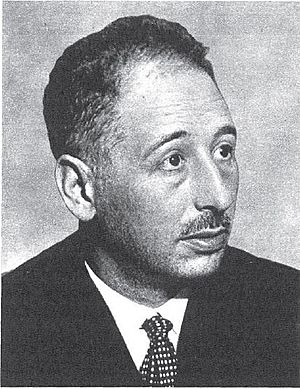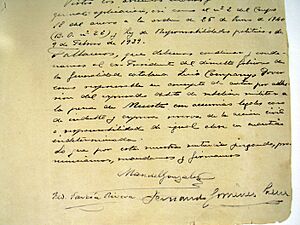Lluís Companys facts for kids
Quick facts for kids
Lluís Companys
|
|
|---|---|
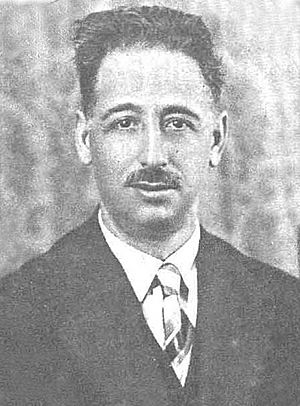 |
|
| 123rd President of the Government of Catalonia | |
| In office 25 December 1933 – 15 October 1940 (Acting until 1 January 1934 In exile from 23 January 1939 to 15 October 1940) |
|
| President | Niceto Alcalá-Zamora Manuel Azaña |
| Preceded by | Francesc Macià |
| Succeeded by | Josep Irla |
| 4th Acting President of the Catalan Republic | |
| In office 6 October 1934 – 7 October 1934 |
|
| Preceded by | Francesc Macià In 1931 |
| Succeeded by | Himself, as President of the Generalitat de Catalunya |
| 1st President of the Parliament of Catalonia | |
| In office 14 December 1932 – 20 June 1933 |
|
| Preceded by | New title |
| Succeeded by | Joan Casanovas i Maristany |
| Minister of the Navy | |
| In office 20 June 1933 – 12 September 1933 |
|
| Preceded by | José Giral |
| Succeeded by | Vicente Iranzo Enguita |
| Personal details | |
| Born | 21 June 1882 El Tarròs, Urgell, Catalonia, Spain |
| Died | 15 October 1940 (aged 58) Montjuïc, Barcelona, Catalonia, Spain |
| Political party | ERC |
| Spouses | Mercè Micó (div.) Carme Ballester |
| Children | Lluís (1911–1956) |
Lluís Companys i Jover (born June 21, 1882 – died October 15, 1940) was an important Spanish politician from Catalonia. He served as the president of Catalonia from 1934 until his death in 1940. This period included the difficult years of the Spanish Civil War.
Companys was a lawyer who cared deeply about the rights of workers. He became a key leader of the Republican Left of Catalonia (ERC) political party, which started in 1931. He played a big part in creating the Second Spanish Republic. In 1934, he became the president of the Generalitat of Catalonia (Catalonia's self-governing body) after the previous president, Francesc Macià, passed away. His government worked to strengthen Catalonia's self-rule and introduce new laws to help people.
In October 1934, Companys declared a new Catalan State. He did this because he disagreed with a right-wing party joining the Spanish government. For this action, he was put in prison from 1934 to 1936. He was still the leader of the Catalan Government during the Spanish Civil War, staying loyal to the Republic. After the war, he went to France. However, the Nazi secret police, the Gestapo, captured him and handed him over to the government of Francisco Franco in Spain. He was then put on trial and executed in 1940.
Contents
Early Life and Political Beginnings
Lluís Companys was born on June 21, 1882, in El Tarròs. He came from a family of farmers, and he was the second of ten children. His parents, Josep Companys and Maria Lluïsa de Jover, sent him to study in Barcelona. He earned a law degree from the University of Barcelona. From a young age, Companys was active in Catalan politics.
In 1906, after a military attack on Catalan newspapers, a new law made it a crime to speak against Spain. Companys helped create a successful group called Solidaritat Catalana. He was jailed many times for his political activities. After a period of unrest in Barcelona known as the Tragic Week, the police even called him a "dangerous individual."
Companys worked with Francesc Layret in the Partit Republicà Català (Catalan Republican Party). In 1916, he was elected as a local councilor for Barcelona. In 1920, he was arrested with other union leaders and sent away to Menorca. Sadly, Layret was killed shortly after by gunmen. Even though Companys was away, he was elected to parliament for Sabadell in the 1920 elections. This election gave him special protection, which helped him get out of prison.
In 1922, Companys helped start a farmers' union called Unió de Rabassaires. He worked as their lawyer and edited their magazine. In March 1931, he became an important member of the new political party, Esquerra Republicana de Catalunya (ERC), also known as the Republican Left of Catalonia.
Proclaiming the Second Spanish Republic
In the 1931 Spanish local elections, the ERC party won a surprising victory in Barcelona. On April 14, Companys and other ERC members quickly took over the mayor's office in Barcelona City Hall. Companys became the new mayor and raised the Spanish Republican Flag from the balcony. He then announced the Republic.
Soon after, Francesc Macià, the leader of the ERC, declared the Catalan Republic. This idea later changed when the new Spanish Republican government promised more self-rule for Catalonia. After taking control of Barcelona City Hall, Companys became the "Civil Governor" of Barcelona Province. This job gave him important powers, like overseeing the police.
In December 1931, Companys was elected to the Spanish Parliament. He led the ERC group and the Catalan representatives there. He explained his goals: "We, the Catalan members of Parliament, are here to defend our self-government law and to work together with other members of Parliament. We also want to help with important matters for Spain, like the Constitution, land reforms, and social laws." In 1932, Companys became the first Speaker of the Parliament of Catalonia.
President of Catalonia and the Catalan State
After Francesc Macià passed away on December 25, 1933, Lluís Companys was chosen by the Catalan Parliament to be the new President of the Generalitat of Catalonia. He formed a new government with different left-wing parties. Under his leadership, the Parliament passed laws to improve life for ordinary people and small business owners. One important law was the Crop Contracts Law, which helped farmers who rented land. This law caused disagreements with the Spanish government.
On October 6, 1934, Companys led a Catalan nationalist uprising. This happened because a new Spanish government, which included ministers from a party called CEDA, was seen by many on the left as being too close to fascism. Companys declared the Catalan State within a "Spanish Federal Republic." For this, he was arrested and sentenced to 30 years in prison. This action was seen as an attempt to go against the new government. The Spanish army stopped the uprising, and the Catalan government members were arrested.
However, after the 1936 election, a left-wing group called the Popular Front won. The new Spanish government released Companys, and the Catalan government was restored.
Spanish Civil War
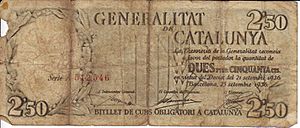
The Spanish Civil War began in July 1936. Companys supported the Spanish Republic against the Nationalist rebels. He helped organize cooperation between different groups, including the Central Committee of Anti-Fascist Militias and the Workers' Party of Marxist Unification (POUM).
During the war, Companys tried to keep his political group united. In November 1936, there was a plan by a radical Catalan group to remove Companys from power. The plot was discovered, and some leaders were jailed. Later, the Soviet Union's consul threatened to stop helping Catalonia. Because of this, Companys removed Andrés Nin, a POUM leader, from his government job in December 1936.
Exile and Execution
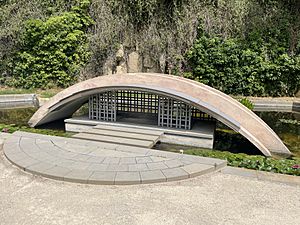
After the Civil War ended in 1939, Companys went to France. He had chances to leave France, but he stayed because his son Lluís was very ill in Paris. On August 13, 1940, he was arrested by the Milice in France. He was then handed over by the Nazi German authorities to the Spanish government in Madrid in September 1940. He was held in a prison for five weeks. During this time, he was kept alone and questioned.
He faced a military trial that lasted less than an hour. He was accused of military rebellion and sentenced to death. A young soldier named Ramón de Colubi defended Companys bravely, even though it put his own life at risk. Colubi asked Franco to pardon Companys, but his request was ignored. As a result of defending Companys, Colubi was forced to leave Spain.
All efforts to save him failed. Companys was executed at Montjuïc Castle in Barcelona at 6:30 a.m. on October 15, 1940. He refused to wear a blindfold. As the firing squad shot, he shouted 'Per Catalunya!' (For Catalonia!). He is buried at the Montjuïc Cemetery, near the castle.
Legacy and Memory
The main stadium used for the 1992 Summer Olympics in Barcelona, located on Montjuïc, is named Lluís Companys Olympic Stadium in his honor. In 1998, a monument to Companys was placed near Arc de Triomf in Barcelona. Many streets and squares in cities and towns across Catalonia are also named "Lluís Companys" to remember him.
His personal papers, including letters and speeches, are kept at the Pavelló de la República CRAI Library – University of Barcelona.
See also
 In Spanish: Lluís Companys para niños
In Spanish: Lluís Companys para niños
- List of people executed by Francoist Spain
- Martyrs of the Spanish Civil War
- Red Terror (Spain)
- White Terror (Spain)
 | Anna J. Cooper |
 | Mary McLeod Bethune |
 | Lillie Mae Bradford |


